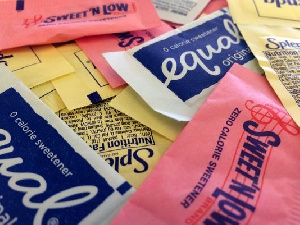I have wanted to write about the negative effects of artificial sweeteners for some time now. With so many people concerned about sugar, they have turned to no-calorie sweeteners.
Artificial sweeteners have taken over supermarket and coffee shops, turning up in everything from sodas to ice cream and yogurt. Low–sugar” or “sugar–free” has become a welcomed trend, given the health hazards of sugar in the average diet.
These supposed “diet-friendly” options emerged to give consumers low-calorie alternatives to real sugar. I first took notice of sweeteners at around age 10, my father who is diabetic swore by these artificial sweeteners. He put it in everything from his coffee to cereals to lemonade. He was hooked on it because artificial sweeteners generally don’t raise blood sugar levels because they are not carbohydrates.
If you’re trying to reduce the sugar and calories in your diet, you may be turning to artificial sweeteners or other sugar substitutes. You aren’t alone. That is why this topic is important, because tens of millions of people believe their diet soda or artificially-sweetened food is the keystone of what they think is healthy nutrition— both for themselves and for their families.
Artificial sweeteners are synthetic sugar substitutes. A sugar substitute is a food additive that provides a sweet taste like that of sugar while containing significantly less food energy. Artificial sweeteners are also known as intense sweeteners because they are many times sweeter than regular sugar.
At the moment, there are five different artificial sweeteners on the market. The one you’re most likely to encounter is aspartame, which also tends to be the worst of them all.
Aspartame and other artificial sweeteners are primarily promoted to diabetics and those concerned about their weight. Despite the fact that artificial sweeteners have repeatedly been shown to produce the exact opposite effects.
Research shows that aspartame worsens insulin sensitivity to a greater degree than sugar. Artificial sweeteners have also been found to promote weight gain, in more ways than one.
Over time, artificial sweeteners have also crept into a wide variety of products not directly targeting diabetics and dieters. They are attractive alternatives to sugar because they add virtually no calories to your diet. In addition, you need only a fraction compared with the amount of sugar you would normally use for sweetness. What is most disturbingly is the food industry groups are now trying to hide the presence of artificial sweeteners in certain foods. The truth is artificial sweeteners are added to about 6,000 different beverages and snacks. They are found in a variety of food and they’re marketed as “sugar-free” or “diet,” including soft drinks, chewing gum, jellies, baked goods, candy, fruit juice, ice cream and yogurt. Artificial sweeteners have become popular for home use.
Some can even be used in baking or cooking.Another issue is artificial sweeteners cause metabolic confusion. When you consume something that tastes sweet but doesn’t contain any calories, your brain’s pleasure pathway still gets activated by the sweet taste, but there’s nothing to deactivate it, since the calories never arrive. Artificial sweeteners basically trick your body into thinking that it’s going to receive sugar (calories), but when the sugar doesn’t come; your body continues to signal that it needs more, which results in carb cravings. Now you have a better understanding about the dangers of artificial sweeteners, I am sure you want to know what alternatives are available. One of the natural alternatives is honey which unlike sugar it is a complex food, one teaspoon contains proteins, amino acids and minerals.
Another alternative is Agave syrup which is derived from an agave cactus, it has low glycemic index. Stevia is an equally good alternative; it is low in calories which is a plus for dieters. Stevia is a 100% natural, zero calorie sweetener with a number of health benefits. It is a green, leafy plant that is native to South America, and has been used for medicinal purposes for many centuries. I urge you to do more research on this topic and find more local alternatives.
Opinions of Thursday, 28 July 2016
Columnist: Bunmi George















